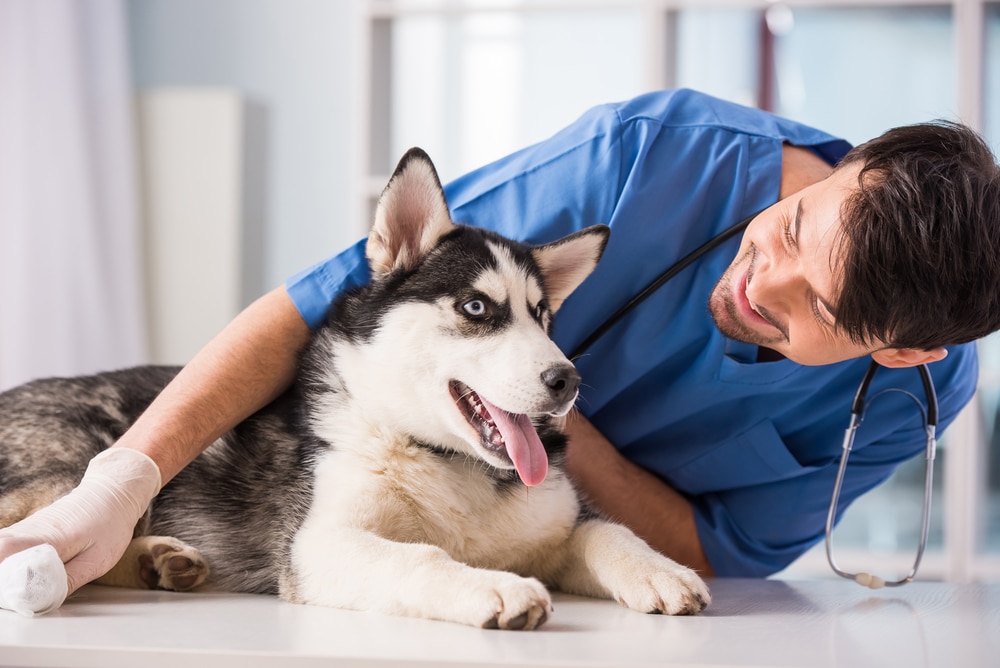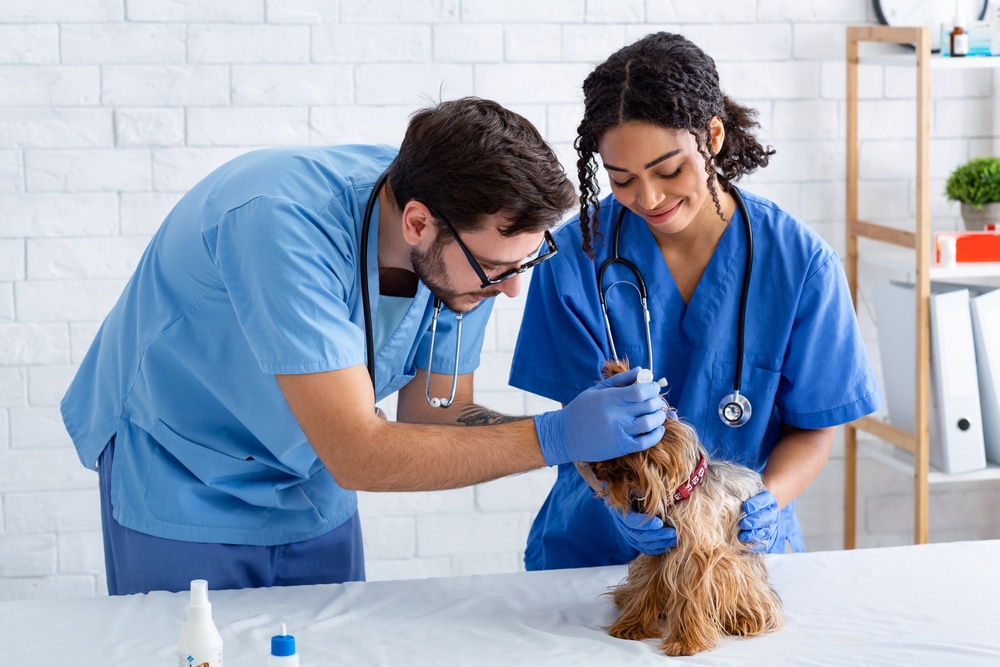Dogs bring us immense joy and companionship, making it essential to look out for their health and well-being. As pet owners, we should be aware of signs that something may be wrong with our pooches. But what are the signs it’s time to go to the vet?
Signs of changes in behavior, such as aggression or lethargy, warrant a checkup for your pup. Symptoms like loss of appetite, coughing, vomiting, diarrhea, and excessive drinking/urinating could reveal an underlying health issue as well. Other signs can include weight gain or loss, bad breath, eye and ear discharge, skin irritations, seizures, or tremors.
Table of Contents
10 Warning Signs Your Dog Needs To Go To The Veterinarian
If your pup is having trouble eating, drinking, or going to the bathroom for longer than a day, it’s time to call the vet. Other signs your dog is in need of medical care include heavy panting, sudden aggression, significant weight loss or gain, unusual vocalizations, and a decreased appetite.
Let’s discuss a few of these in more detail.
Changes In Behavior
Your pet’s health and well-being are always important, but it becomes even more critical when an unexpected behavior change occurs. Pay close attention to any changes in your pet’s behavior, such as decreased activity, aggression, lack of appetite, restlessness, or avoiding contact. If they’re sleeping more than usual, it’s important to arrange an appointment with the vet soon. Early detection can improve their long-term health outcomes.
Loss Of Appetite
Loss of appetite in pets can be caused by medical issues such as infection, cancer, digestive disturbances, or hormonal imbalances. It can also be due to environmental stressors like changes in the home routine post-adoption/moving.
Monitor any changes in appetite and consult your vet if the loss of it persists. Appetite can decrease naturally, but it’s important to take note.
Coughing, Vomiting, Or Diarrhea
If your pet has been coughing, vomiting, or has had diarrhea for more than 24 hours, take them to the vet. Medical attention may be needed. Coughing can be a sign of an infection or respiratory issue, while vomiting and diarrhea could point to a digestive problem such as parasites or dietary intolerance.
Mild cases may be treatable with rest and dietary changes, but frequent episodes should be evaluated by a professional.
Increase In Licking Certain Areas
Excessive licking of certain areas in your pet may be an indication that something is wrong. Excessive licking may indicate health issues, so it’s important to consult your vet if the behavior persists. This can cause irritation and infection of the skin, both causing discomfort for your pet.
Excessive Drinking Or Urinating
Diabetes, Cushing’s, and kidney issues can all cause your pet to drink or urinate excessively. If you notice any changes in your pet’s water intake or urinary habits, it is important to consult your vet for a proper diagnosis and recommended treatment plan.
Weight Gain Or Loss
If your pet’s weight drastically changes (more than 10%) suddenly, seek veterinary advice right away. Unexpected weight gain or loss could be a sign of an underlying health condition such as thyroid disorder, diabetes, cancer, or something else.
Difficult Breathing
Pets having trouble breathing are in danger. Difficulty breathing can be a sign of many conditions, such as heart disease, lung infections, asthma, foreign objects blocking the airway, collapsing trachea, or even tumors.
If left untreated, this condition can have serious, even fatal, outcomes. Pet owners should be aware of potential symptoms of difficulty breathing and consult a vet for immediate treatment. Diagnosis and treatment can alleviate symptoms and improve your pet’s quality of life.
Discharge From Eyes/Nose
If your pet has ongoing eye or nose discharge, it could be a sign of a medical issue. Causes may include allergies, parasites, bacterial infections, eye injuries, and even tumors. Take your pet to the vet for an accurate diagnosis; they’ll have the best advice on how to help them recover quickly and safely.
Eye, Ear, Or Skin Irritations
Watch out for any eye, ear, or skin irritations in your pet; they may be a sign of allergies, parasites, bacterial infections, and more. These signs include redness, swelling, inflammation, discharge from the eyes/nose/ears, and excessive scratching. Early detection of symptoms can help ward off more serious complications and even death.
Seizures Or Tremors
Seizures and tremors can be signs of distress for pets, often caused by conditions such as epilepsy, metabolic disturbances, or kidney failure. If your beloved pet displays these symptoms, consulting a vet is the best course of action to diagnose the underlying cause and provide effective treatment.
How Soon To Take Your Dog To The Vet If You Notice Any Warning Signs

It is important to take your pet to the vet as soon as possible if you notice any of these warning signs. The sooner you get them to the vet, the better your chance of getting a proper diagnosis and identifying any underlying medical conditions.
Depending on the severity of the symptoms, it’s best to seek help within 24 hours so that necessary treatment can be provided. If your pet is exhibiting an emergency situation, such as difficulty breathing or loss of consciousness, seek immediate veterinary care.
What To Do If Your Vet Isn’t Available
If your vet isn’t available or it’s outside of regular business hours, contact the nearest local animal emergency hospital or clinic. They will be able to provide immediate medical care and treatment if needed. You can also search online for “online vet care for my dog.” There are many services that can provide remote virtual vet care, so you don’t have to wait until the next business day for help.
Additionally, if your pet is experiencing an emergency situation or a life-threatening condition, such as poisoning, contact the Pet Poison Helpline at (888) 426-4435 for advice. The helpline is open 24 hours a day and can provide you with information about possible health issues and how to proceed.
In Conclusion: Signs It’s Time To Go To The Vet
Pets can’t tell us how they feel, so it’s important to watch for signs of illness. Common indicators that your pet needs medical attention include changes in eating habits, excessive licking or scratching, difficulty breathing, discharge from the eyes/nose, and seizures/tremors.
If you spot any of these symptoms in your pet, reach out to your local vet for a diagnosis and treatment plan. Early detection and intervention can help minimize symptom severity and improve their well-being.
So, are you noticing any signs in your dog that indicate it’s time to go to the vet? We hope not, but if you are, let us know in the comments below!
